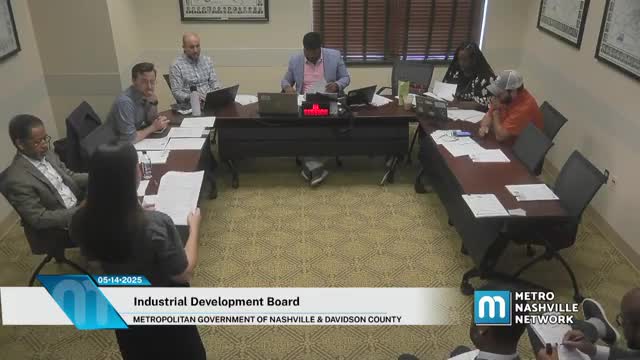Board Commends Phillips for Transparency in Demographic Data Sharing
May 16, 2025 | Industrial Development Board Meetings, Nashville, Davidson County, Tennessee
This article was created by AI summarizing key points discussed. AI makes mistakes, so for full details and context, please refer to the video of the full meeting. Please report any errors so we can fix them. Report an error »

In the heart of Nashville, the Industrial Development Board convened to discuss pressing matters that could shape the city’s economic landscape. As board members gathered, the atmosphere buzzed with anticipation, particularly around the implications of the recently passed "Do Better" bill, which aims to enhance transparency and accountability in local business practices.
One of the standout moments came when a board member praised Phillips, a local company, for their proactive approach in sharing demographic information. This gesture of transparency was highlighted as a significant step forward, reflecting the board's commitment to inclusivity and responsible governance. The acknowledgment of Phillips’ efforts set a positive tone for the meeting, emphasizing collaboration between businesses and the board.
As discussions progressed, questions arose about the future of Phillips, particularly regarding their recent building sale and potential expansion plans. While the board member expressed curiosity about Phillips' intentions, the response was cautious, indicating a need for further inquiry. This uncertainty reflects the broader challenges businesses face in navigating a post-pandemic landscape, where hybrid work models have become the norm.
The conversation then shifted to the evaluation of job grants in light of changing work dynamics. A board member raised an important point about how the city assesses the economic impact of jobs, especially when employees may only be in the office part-time. This inquiry underscores the need for a revised approach to economic evaluations, as traditional metrics may no longer apply in a world where remote work is increasingly prevalent.
As the meeting drew to a close, the discussions highlighted the board's ongoing efforts to adapt to new realities while fostering a supportive environment for local businesses. The commitment to transparency and thoughtful evaluation of economic policies suggests a forward-thinking approach that could benefit Nashville's growth in the years to come. With the landscape of work evolving, the board's ability to navigate these changes will be crucial in shaping a resilient and inclusive economy for all Nashvillians.
One of the standout moments came when a board member praised Phillips, a local company, for their proactive approach in sharing demographic information. This gesture of transparency was highlighted as a significant step forward, reflecting the board's commitment to inclusivity and responsible governance. The acknowledgment of Phillips’ efforts set a positive tone for the meeting, emphasizing collaboration between businesses and the board.
As discussions progressed, questions arose about the future of Phillips, particularly regarding their recent building sale and potential expansion plans. While the board member expressed curiosity about Phillips' intentions, the response was cautious, indicating a need for further inquiry. This uncertainty reflects the broader challenges businesses face in navigating a post-pandemic landscape, where hybrid work models have become the norm.
The conversation then shifted to the evaluation of job grants in light of changing work dynamics. A board member raised an important point about how the city assesses the economic impact of jobs, especially when employees may only be in the office part-time. This inquiry underscores the need for a revised approach to economic evaluations, as traditional metrics may no longer apply in a world where remote work is increasingly prevalent.
As the meeting drew to a close, the discussions highlighted the board's ongoing efforts to adapt to new realities while fostering a supportive environment for local businesses. The commitment to transparency and thoughtful evaluation of economic policies suggests a forward-thinking approach that could benefit Nashville's growth in the years to come. With the landscape of work evolving, the board's ability to navigate these changes will be crucial in shaping a resilient and inclusive economy for all Nashvillians.
View full meeting
This article is based on a recent meeting—watch the full video and explore the complete transcript for deeper insights into the discussion.
View full meeting
